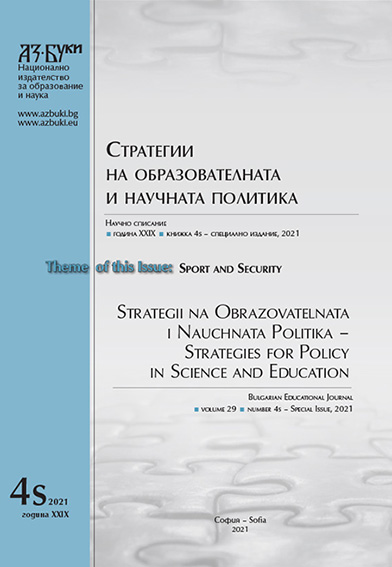Impact of Lockdown on the Training Process and Ranking in Taekwondo ITF Competitions During a Pandemic
Impact of Lockdown on the Training Process and Ranking in Taekwondo ITF Competitions During a Pandemic
Author(s): Silvia Ilieva-SinigerovaSubject(s): Social Sciences, Education, Sociology, Educational Psychology, State/Government and Education, Evaluation research, Health and medicine and law, Environmental interactions, Sports Studies, Sociology of Education, Distance learning / e-learning
Published by: Национално издателство за образование и наука „Аз-буки“
Keywords: COVID-19; pandemic; online competitions; taekwondo
Summary/Abstract: The last year of the global COVID-19 pandemic has provoked unprecedented countermeasures in all sectors of the economy, including individual, group, institutional and industrial. The sports industry suddenly stopped all events. The aim of the present study was to evaluate the effect of the introduced emergency measures in Bulgaria on the training process and the performance of taekwondo ITF athletes in the discipline “pattern” of the state online championship in 2020.The study was conducted in the period 27/04-10/05/2020 and involved 79athletes, profiled as representatives of large cities (Sofia, Plovdiv, Varna) –27.8% and 72.2% – of small cities. The division was provoked by the various measures that were imposed during the state of emergency. The survey was conducted through an Internet-based questionnaire, which contains 23 items related to the training process during the state of emergency, as well as the ranking of the competitors in the online championship. The analysis made were the following: alternative analysis (to establish the relative shares of different responses in the questionnaires), comparative analysis (U – criteria of Mann Whitney), Varimax factor analysis and Hierarchical cluster analysis (Ward’smethod). Statistically significant differences were found in the conducted training for equipment, in which in the big cities 4 – 5 times a week the athletes did not train, while in the small ones – 3.5%. The largest number of trainees conducted 1 – 2training sessions a week. In the big cities it ranked second 3 times a week, while in the small cities – I have not trained. It was noteworthy that the representatives of the big cities evaluate the sharing of video trainings positively, while in the small cities they were hesitant in their opinion and the competitors indicate different evaluations.
Journal: Стратегии на образователната и научната политика
- Issue Year: 29/2021
- Issue No: 4s
- Page Range: 90-100
- Page Count: 11
- Language: English
- Content File-PDF

